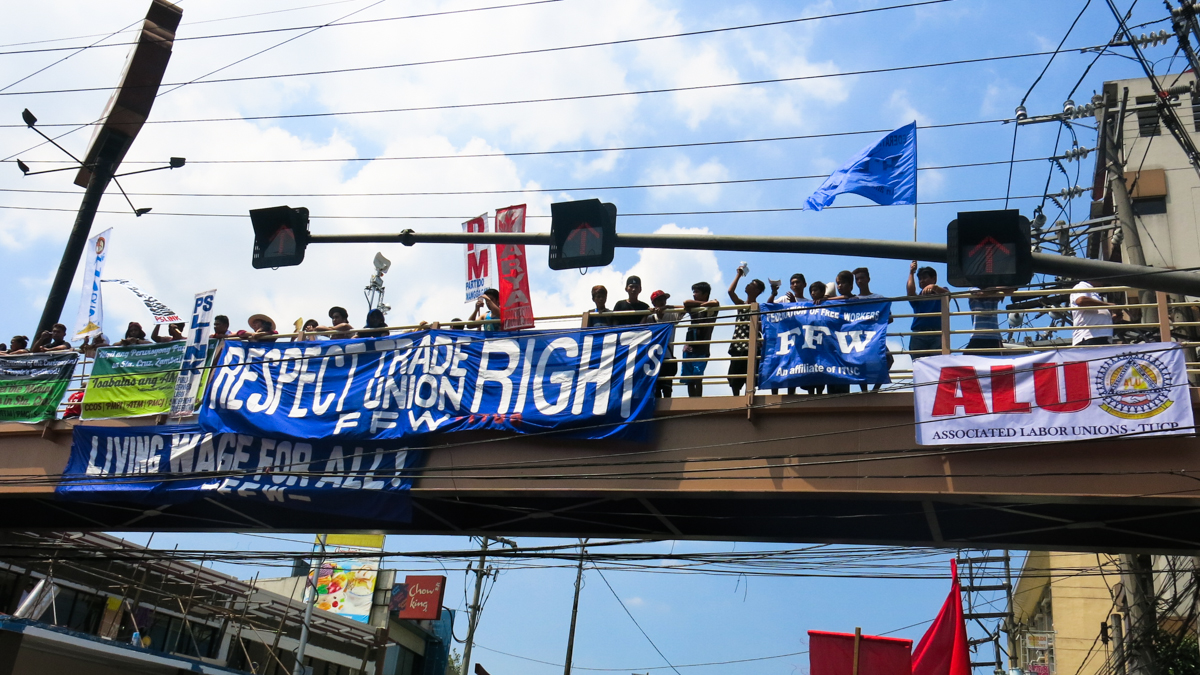Carlos* was employed for five months in 2013. In 2014, he worked as a bagger in a mall for another five months until he had to look for a job again. He became a mall promoter next, then a waiter, switching from one post to another, always a month short of being granted tenure.
“Pinapakinabangan lang kayo ng limang buwan tapos pag ‘di na kayo kailangan, itatapon na kayo. Maghahanap ka na naman ulit ng bagong trabaho (Companies use your service for five months then dispose of you when you are no longer needed. After that, you have to look for another job),” Carlos said on national television, addressing the 2016 presidential candidates assembled on the stage before him in the final PiliPinas debate on April 24.
The Trade Union Congress of the Philippines estimates that there are around 25-35 million contractual laborers like Carlos among a workforce of 67 million in the country. Contractualization, in all its forms, mainly aims to lower the production costs of companies in the face of globalization.
The rise of contractualization
The country saw a rise in contractualization in the 1990s, with firms taking advantage of loopholes in the Labor Code, which was amended in 1989. Article 281 of the amended code warrants regularization for laborers who have worked in their respective firms or companies for at least six months. The 5-5-5 scheme and the end-of-contract, also known as “endo,” are among the ways that companies escape worker regularization. Contractuals are only employed under probation – they face greater job insecurity than the rest of the labor force.
According to Alternative Law Groups National Coordinator Atty. Marlon Manuel, the most basic right of laborers is the right to security of tenure. “Unless you have that right, you will not have a meaningful exercise of all the other rights of workers,” he said in a 2012 interview, pointing out “subcontracting” as the primary cause of such insecurity. Subcontracting entails intermediary agencies to supply a portion of a company’s manpower instead of the company directly hiring workers.
“What we are seeing now is the proliferation of many manpower services contractors that are supplying workers beyond [security and janitorial] services,” Manuel said. Contractualization now exists across industries, from “construction to manufacturing and even in the information and communications sector,” according to an Inquirer report in 2014.
Contractual workers rarely get overtime pay and only receive minimum benefits like Social Security System and PhilHealth insurance, according to the same report.
“If you look at the labor code, the intention is very clear: the government should regulate contracting arrangements [that] may prevent employees from attaining regular status,” Manuel said. According to a 2014 study published in the Philippine Law Journal, contractualization persists mainly due to “abject poverty, the lack of employment opportunities in the country, and the generally ambivalent perception of employees towards joining unions.” For these reasons, they choose to remain contractuals rather than risk unemployment.
Union decline?
According to the Alliance of Progressive Labor (APL), trade unionism is at decline, citing globalization, the domination of political parties over unions, and the seemingly irreplaceable union heads as the main reasons. A University of the Philippines study also suggests the same reasons, adding that the national economy is in a transition from a manufacturing economy to a services economy owing to technological innovations in production.
For Manuel, the focal point would be security of tenure. He explains that it is difficult for workers to join labor unions without it.
“If you are not secured in your employment, you will not dare organize or join a union,” Manuel says. Belonging to a union slims the employee’s chance of becoming a regular employee. Probationary employees, for example, are under the evaluation of the company. Belonging to a union jeopardizes the employee’s relationship with the company.
Regular employees who are already unionists have an entirely different set of problems to face. Labor strikes, their refusal to carry on fulfilling the demands of their job until employers attend to their demands, has also been at a decline.
In the Philippines, strikes can only be done by legitimate labor organizations or unions registered with the Department of Labor and Employment (DOLE). These labor organizations exist for the purpose of collective bargaining and dealing with employers about pay and conditions for employment. According to DOLE, labor strikes happen when they approve of labor organizations’ strike notices on the grounds of unfair labor practice or deadlock in collective bargaining. In order to prevent strikes, DOLE provides mediation between the unions and employers to reach an agreement.
While there have been efforts to address these labor issues, no definitive solutions have been done. Senate bill 3030 on Labor-Only Contracting was listed as pending as of December 9, 2015 and was not taken up by the House of Representatives.
With an impending new administration under president-elect Rodrigo Duterte, the irregular employees are promised better working agreements. One of the discussion topics in the ABS-CBN presidential debates was the end of contractual labor or “endo.” Duterte vowed to pass a law to end contractualization.
“Contractualization will stop. They have to stop it…It is an injustice committed against the Filipino people. I will not allow that as president of the country,” he said.
Editor’s note: *Full name not disclosed





Congratulations to The Guidon editors and to the author- writers who obviously made good background research on a very timely social issue. Congratulations and thank you for this enlightening article. Responsible and progressive unions are declining in number and in power in this age of globalization. But if they are empowered, unions are very strategic in allowing inclusive growth benefit the workers who helped built the country’s wealth.